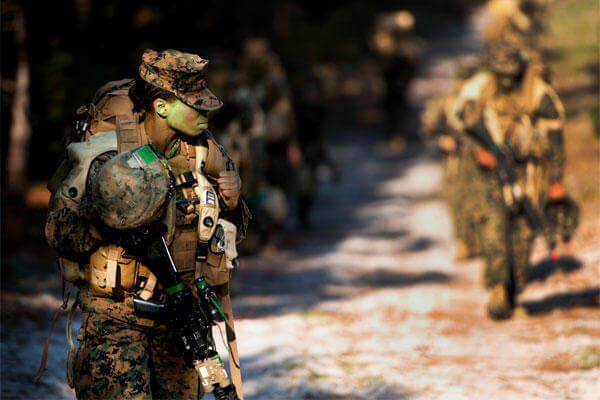Marine Corps Commandant Gen. Robert Neller acknowledged to lawmakers on Tuesday that female Marines who fared poorly in recent gender-integration study did not have the infantry experience of the male Marines they competed against in the effort.
Senior military leaders testified at the Senate Armed Services Committee on the progress of bringing women into direct-action, combat-arms jobs such as the infantry.
Much of the hearing focused on the controversy surrounding the findings in a 1,000 page study that emerged last fall from the Marine Corps Ground Combat Element Integrated Task Force.
The effort showed that gender-integrated units made up of men and women did not perform as well as all-male units. All-male units demonstrated higher performance levels than gender-integrated units on 69 percent of tasks evaluated.
Gender-integrated teams performed better than their all-male counterparts on two of the 134 tasks, the study said. All-male squads also had a "noticeable difference in their performance of the basic combat tasks of negotiating obstacles and evacuating casualties."
But Sen. Kirsten Gillibrand, a Democrat from New York, criticized the Marine study, calling it "fundamentally flawed."
"The design of this research was very flawed," she said. "First of all, female Marines were screened for the basic physical fitness test and were competing in a large part with male Marines who had years of experience and training and many had combat positions.
"All we really know from the study is that groups who had the right training and more training did better," she added. "We don't actually have data that can be used because these women did not have the same training and experiences as those who had been doing it for a long time."
The effort compared the performance of units with inexperienced female Marines -- fresh out of training -- against units made up of experienced male infantrymen, while focusing on speed and accuracy when engaging targets with multiple weapons systems, Military.com reported in October.
"I think it would be unfair to any of those Marines particularly those females who participated in the [GCEITF] to say they weren't trained," Neller said.
The female Marines that participated in the effort were first sent to the MOS schools for infantry, artillery and armor, he said.
The women were then formed into the ground combat task force for four months of preparatory training, where they trained with men and developed the skills that they needed do this evaluation, he said.
Gillibrand argued that "four months doesn't compare to the years that a lot of these units have been working together, doing this MOS."
None of the Marines had ever served in the test unit before, but Neller did concede that males in the all-male units did have more experience in combat arms jobs such as infantry.
"It is fair to say -- I will agree with you -- that their experience in these MOSs was probably not up to the level of their male counter parts," Neller said.
The first two female soldiers to graduate U.S. Army Ranger School experienced a similar challenge.
First Lt. Shaye Haver and Capt. Kristen Griest completed the grueling, 62-day infantry course in August. Haver, an Apache pilot, and Griest, a military police officer, struggled at first with passing the graded infantry patrols.
The female Ranger candidates did receive several days of training on how to lead patrols during the Ranger Training Assessment Course at the Army National Guard's Warrior Training Center at Benning.
But Ranger School students who come from infantry, armor and Special Operations Command units have a higher graduation rate compared to other MOSs, Ranger School officials say.
The two largest groups that feed Ranger School are second lieutenants from the Infantry Officer Basic Leaders Course and members of the 75th Ranger Regiment, Benning officials said.
The lieutenants have just completed 17 weeks out of the Infantry Officer Basic Leaders Course, which is focused primarily on the tactics techniques that an infantry platoon leader is expected to know and understand and be able to execute when he gets to his first unit of assignment.
Similarly, Rangers from the Ranger Regiment serve 18 months to 24 months training on infantry tasks, even though they are a special-operations unit.
The senior leadership at Ranger School and the Maneuver Center of Excellence agree on one point: If male students had an advantage over females in this gender-integrated Ranger course, it had less to do with physical strength and toughness and more to do with the on-the-job experience that most male students have acquired serving in infantry roles.
Committee Chairman Sen. John McCain, a Republican from Arizona, asked if Neller thought this study was "fatally flawed."
"I do not," Neller answered. "We have had this study peer reviewed by numerous groups."
McCain asked "So you think it was a legitimate study?"
"Within the time we had, yes chairman," Neller said.
-- Matthew Cox can be reached at matthew.cox@military.com.



























